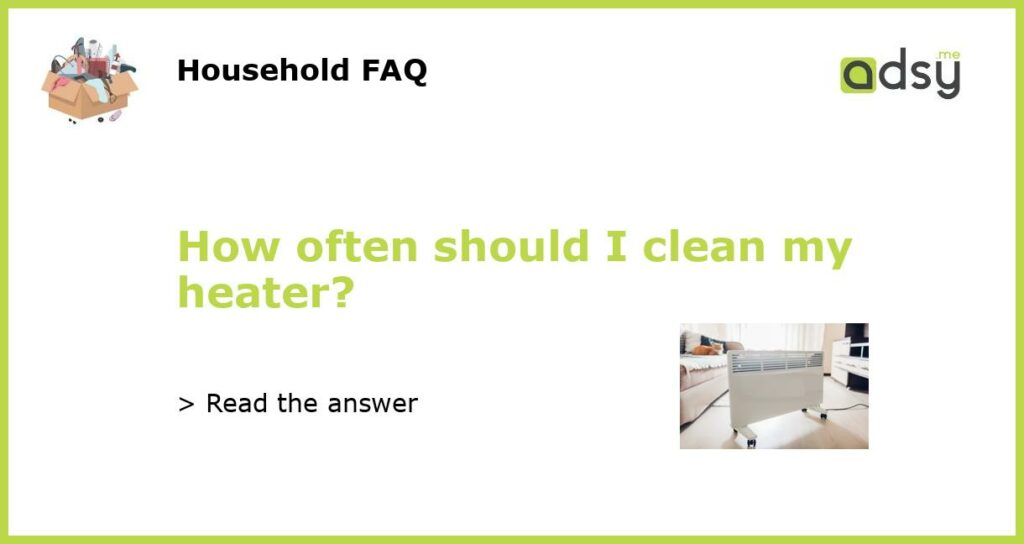The Importance of Regular Heater Cleaning
Regular maintenance is vital for the smooth operation and longevity of any appliance, and your heater is no exception. Neglecting to clean your heater can lead to a variety of issues, including reduced efficiency, poor air quality, and even safety hazards. Therefore, it is recommended to clean your heater at least once a year, but the frequency may vary depending on various factors.
Factors Affecting Cleaning Frequency
Several factors can influence how often you should clean your heater. The type of heater you have, the environment it operates in, and how frequently it is used can all play a role in determining the cleaning schedule.
If you have a gas furnace, it is advisable to have it professionally serviced and cleaned annually. Gas furnaces produce combustion gases, and a dirty burner or flue can lead to incomplete combustion, resulting in increased carbon monoxide production. This poses a significant safety risk, making regular cleaning and inspection critical.
For electric heaters, maintenance needs are generally less frequent. However, it is still recommended to clean them annually to remove any dust or debris that may have accumulated on the heating elements. This will ensure optimal performance and prevent potential fire hazards.
The environment in which your heater operates also impacts its cleaning needs. If you live in a dusty area or have pets that shed fur, your heater may require more frequent cleaning. Dust and pet hair can clog the heater’s filters and reduce its efficiency. Additionally, if your heater is located in a high humidity environment, mold growth may occur, necessitating more frequent cleaning.
Signs Your Heater Needs Cleaning
While a general guideline is to clean your heater annually, there are some signs that indicate the need for more frequent cleaning. If you notice any of the following, it is best to schedule a cleaning sooner rather than later:
1. Reduced airflow: If you feel that your heater is not blowing out as much air as it used to, it may be due to a clogged filter or ductwork. Cleaning these components can help restore airflow and efficiency.
2. Strange odors: If you smell a burning or musty odor when your heater is running, it could indicate the presence of dust or mold. Cleaning the heater can eliminate these odors and improve air quality.
3. Increased energy bills: A heater that is dirty and inefficient will require more energy to produce the same amount of heat. If you notice a significant increase in your energy bills without a corresponding change in usage, it may be time to clean your heater.
DIY vs. Professional Cleaning
When it comes to cleaning your heater, you may be wondering whether to tackle the task yourself or hire a professional. While there are some maintenance tasks you can safely perform on your own, such as cleaning the filters and vents, it is generally recommended to have a professional service your heater annually.
A professional HVAC technician has the knowledge and expertise to thoroughly clean and inspect your heater, ensuring all components are in good working order. They can also identify and address any potential issues before they become major problems. Professional cleaning can help prolong the lifespan of your heater and ensure its efficient operation.
The Benefits of Regular Heater Cleaning
Regularly cleaning your heater offers several benefits:
1. Improved air quality: Dust, pollen, and other allergens can accumulate in your heater, impacting the air quality in your home. Cleaning the heater removes these particles, providing cleaner and healthier air to breathe.
2. Increased energy efficiency: A clean heater operates more efficiently, requiring less energy to heat your home. This can result in lower energy bills and reduced environmental impact.
3. Prolonged lifespan: Regular maintenance, including cleaning, can help extend the lifespan of your heater. By preventing the buildup of dust and debris, you can minimize wear and tear on the components, ensuring they function properly for longer.
4. Enhanced safety: Proper cleaning and maintenance of your heater reduce the risk of safety hazards, such as carbon monoxide leaks or electrical malfunctions. This is especially important for gas furnaces, where incomplete combustion can lead to carbon monoxide poisoning.
By adhering to a regular cleaning schedule and ensuring professional maintenance when necessary, you can keep your heater running smoothly, efficiently, and safely for years to come.






